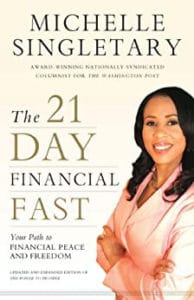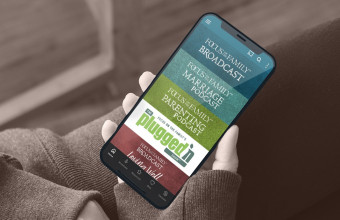Preview:
Michelle Singletary: And so I want you to get acquainted with limitations. And so the fast is to shut it down, limitations, limitations, limitations. And so… And then credit obviously, to get you started thinking about debt. And people think, “Oh, it’s easy. I could do that for 21 days.” About day three, I started getting emails from people like, “You are crazy. I can’t… What, you know,” because we just, we just spend so much.
End of Preview
John Fuller: That’s Michelle Singletary, talking about some rather common reactions to her suggestion that you might need to take a 21-day financial fast from all unnecessary spending. And right there, it sounds like it might be a little harder to implement than we’d like it to be. You’ll hear some encouragement to save more and to be a better steward of your finances today on Focus on the Family with Jim Daly.
Jim Daly: John, as we said last time, uh, finances can be a big problem in marriage and really it’s a symptom of our behavior. And that’s what, uh, Michelle’s talking about in that soundbite. And if you missed our broadcast last time, get the download to CD or get the app for your smartphone. It’s really good information. And I thought she really spoke from both her heart and her head about the importance of knowing how to spend money wisely.
John: Yeah, she’s a really winsome guest, and we’re gonna have details online about how you can get a copy of Michelle’s book, The 21-Day Financial Fast. Our website is focusonthefamily.com/broadcast or go ahead and give us a call 800 the letter A and the word FAMILY. Let’s go ahead and join day two of the conversation on Focus on the Family.
Jim: Uh, Michelle, let me welcome you back to Focus on the Family.
Michelle: Oh, thank you. It’s my pleasure. I love talking about this stuff. (laughs)
Jim: Well, I could see it, your face you’re bubbly about it, (laughs) and that’s good. Not too many people are bubbly about their finances. (laughs)
Michelle: I know.
Jim: But, uh, you write for the Washington Post, that is no, uh, small achievement that you’re a columnist with the Washington Post, that’s big-time stuff. So congratulations.
Michelle: Thank you. I do feel blessed.
Jim: Yeah.
Michelle: And in fact, it’s so funny the, the reason why I got the column and it’s syndicated across the country, so people might see it in their, uh, newspaper, was because of my grandmother, Big Mama. I, um, you know, I work at the Washington Post and in the very, um, very talented…
Jim: She must be proud of you.
Michelle: You know, oh, she was, she was. (laughs) I left my hometown paper to go to the Post and she wasn’t happy about that ’cause she wanted me to stay in Baltimore. Um, but when I got to the Post, I was bringing my lunch. Now in Washington, the whole thing about Washington is you have to do lunch. And so when I got there, people were like, “Oh, you wanna go out lunch with us?” I was like, “Do you all know how much it costs to go to lunch?”
Jim: Mm-hmm. (laughs)
Michelle: And so I’m bringing my bag lunch to the Washington Post, right?
Jim: Right.
Michelle: So I’m the only person at my desk, most days, you know, with my lunch, there was a couple of other people who were good about that as well. And so my editor was like, “You’re always talking about this Big Mama and money, you should write a column about it.” This was like, I think in ’97, um, before personal finance became sort of the, the big thing. And so I wrote about what I learned from my grandmother, Big Mama. And this is even before email (laughs) and internet, you know. We got so many bags of mail that they were just blown away. And we’re talking from people from all walks of life, you know, old, and young, and rich, and black, and white, and Jewish, and Christian. I mean, it was just, they were like, “Wow, you know, somebody who thinks like me or somebody had a grandmother like me.” Um, and so that’s what really started the column. I just talked about the principles that my grandmother, you know, taught me about money. And then from there I just started writing a column and now, you know, 100 clients later, newspaper clients, um, it’s syndicated across the country and I couldn’t be happier. And I stuck right to my roots. I’m still very simple about, because the things that would take for you to be rich, um, are not what people think. You know, you go to a forum and people want you to give them some stock tips, or investment tips, or what’s the secret to being rich. Um, there really isn’t a secret, it’s the same tried and true method, um, that for me, anyway, you give first, ’cause that has to be the first thing that you do with your money to give it away to tithe, to give to your local church, to give to places like Focus on the Family, you got, that has to be taught even above your mortgage.
Jim: Mm-hmm.
Michelle: Because if you don’t, if it’s last, if you pay everybody else that’s not enough. And I feel like when you put yourself in a process of giving first, God is going to return it back to you. It’s not a tit for tat. But he looks down and he says, “Oh, there’s a good and faithful steward right there.” Um, and then secondly, you know, here’s the thing about what I love about this is that, you know, it doesn’t take some great stock tip, it just live below your lens, put your head down, say, what are your priorities? When we do studies and people say, what are your priorities? They say the right things. I want to pay my house off. I wanna retire. I wanna give to my church. I wanna send my kids to college. But then when you look at their checkbook, it doesn’t reflect their values.
Jim: Mm-hmm.
Michelle: And so I’m just trying to align you up there. And if I could tell you this really quick story, my pastor, who’s just wonderful. He did this one Sunday. He asked us how many people are rich. Now I belong to a mega church, thousands of people. You can count on one hand the number of people who rose their hand. I did not hold up my hand and I didn’t for the same reason all those thousands of other people didn’t, because we were all in our head thinking, “Well, I don’t have enough for my retirement. I don’t have enough of this. And I don’t, du-du-du-du. And, and what does he mean by that? Does this mean is?” And we were all doing these calculations. And so then he asked us a series of questions. I will never forget this sermon. He said, “How many of you can get up in the morning and get a clean glass of water? How many of you can open up the closet and decide what to wear? How many of you could, um, have a meal? Not, you know, a couple of meals, some of you could push back from some meal.” He said, “How many of you have somebody who loves you?” And then as he asked each of these questions, we all kind of sunk out chairs because our definition of rich was wrong. And if you use his definition of rich, if you… And we talk about that in a book about being content. If you are more content, you have more money because you’re not trying to get so much stuff.
Jim: Right. I mean, that is well said. The, the key there though is how much discontentment there is.
Michelle: Right.
Jim: Uh, especially in our culture, Western culture, particularly, but certainly in America and Canada. When you look at it, um, it, it’s almost like they prey on that. They’re pushing us. They’re pushing us to that discontent level.
Michelle: Right.
Jim: Um, why is that, and then we, as people of faith, how should we be responding in a culture that’s indulging us? And let me ask you this too, uh, when it comes to that entitlement feeling, it’s all kind of tied together.
Michelle: It is.
Jim: So how do we get free of the snare of feeling like I’m owed something?
Michelle: Right. And entitlement and contend are two different things. Entitlement is like, I deserve something. And excuse me, I had a sense of entitlement. I don’t like to be cold. You know, I just don’t like to be cold. And I don’t want to wear a whole bunch of sweaters ’cause I don’t want a whole bunch of stuff on my body. And so my husband kidnapped my space heater one year (laughs) because our energy bill was too high. He literally kidnapped it and wouldn’t give it back. (laughs) And then he went through out our house and put in programmable thermostats so that it would adjust. Because during the night before he put them in, he’ll go to sleep, I turn the heat up. I’m not even gonna tell you the temperature ’cause it’s really, it’s energy efficient.
Jim: Oh, come on you got this.
Michelle: Oh my gosh, it was terrible. Like to 80, which is crazy.
Jim: Wow. (laughs)
Michelle: Yes. I mean, it’s like living in the tropics. (laughs) I’m like killing it.
Jim: Now I understand your husband’s actions. (laughs)
Michelle: He’s like, he get… He’ll be like he’d wake up in the middle of the night and go [inaudible]. (laughs)
Jim: I can’t breathe.
Michelle: “What did you do?” And so we had this battle all night long of turning the air, you know, the heat up and down, up and down. So he finally put it in programmer and he threatened me. He’s like, “Don’t you touch these thermostats?” Um, and you know, he was right because I had this sense of entitlement, why can’t I throw one an extra sweater? You know, first of all, it saves our energy bill, but also we needed to be… I needed to be more energy efficient because that’s a good admirable thing to do. Now, some nights I have on footie pajamas, that’s his fault. (laughs) He’s not too happy about those nights. (laughs)
Jim: Oh, man. (laughs)
Michelle: I just pray to the program [inaudible]. (laughs)
Jim: The way to my heart, (laughs) the programmable thermostat. (laughs). No, that is good.
Michelle: So, so for me, I had to get rid of that sense of entitlement that I was entitled to all this heat, which is crazy. Um, and we, we know, we say things like I’m into, I work hard, so I’m entitled to a vacation, even though you’ve got debt and you don’t have the money for it. Now, contentment, we are bombarded with messages, not to be happy where we are. I personally think that’s why we have such a high divorce rate because you’re not happy with the spouse that you have because you’re not happy, so you got to go get another one. And we’re teaching our kids that, that can’t be satisfied. I mean, we have birthday parties that are more like coronations, you know? And, and if we’re having those, when they’re young, you know, what do they have to look forward to? I mean, my husband, who’s very frugal, ’cause I, I wanted to marry somebody who was similar to me. (laughs) And when we were dating, he wouldn’t shower me with stuff because he says, “If I do all this now, what do you have to look forward to?” You know, he likes, he’s like, you know, “If I shoot for the moon, you know.” (laughs)
Jim: You know, Michelle, it’s good. It’s good to hear that. But it sounds like you married well-
Michelle: I did.
Jim: … And he married well.
Michelle: Exactly.
Jim: So you’re both very frugal, that’s not most people.
Michelle: Right.
Jim: Um, and I’m, I’m thinking of, uh, the couple that’s really struggling. Uh, let’s talk to the Christian couple who’s really struggling and they haven’t been able to curb their appetite. So, um, that’s been a bit out of control. How do they invite God into that process?
Michelle: You know, there’s a day in the book where we talk about couples and money. And um, I believe that you have to, first of all, I’m gonna talk to people who are thinking about getting married and people who are already married. So let’s start with the people who are already married. You’ve got to sit down and come up with a plan, because you’re right, opposites tend to attract, savor marriage and spend thrift, and it causes for a lot of combustion. And it’s interesting, you should say, it is true that people say money is the number one reason why they get divorced, but it’s not the lack of money or the abundance of money, it’s all those underlying issues, the sense of entitlement, you know, contentment. I mean, I grew up poor. So you have people in marriages who grew up poor, who, who say, “I don’t ever want to be poor again, I’m going to get whatever I want because I didn’t have shoes when I was growing up.” And so they overspend. Or you have people who grew up in miserly homes, and so they wanna over spend, because they were denied so much as a child. Or you have people who grew up in homes that were good, they had money. And so now they’re trying to repeat that situation. Um, and so what I tell couples is get to the root first because you can’t heal that unless you know what’s going on. And how do you get to the root? I believe in Christian counseling, I’d be like talk to your pastor, get into a program at your church. My church has a number of programs. Um, and so you got to come up with a plan. And so we have, in a book I talk about house rules. So for example, you know, you have to have a… My husband came up this, you have to have two yeses in one no. So unless you both agree to something, you can’t buy it. It took us eight years to get a dining room set. (laughs)
Jim: Eight years for dining room set.
Michelle: Eight years. Because our starting so different and we couldn’t agree so we couldn’t get a dining room set. And you know…
Jim: Do you have a floor for that purchase amount? I mean, do you have that kind?
Michelle: The floor depends on where you are. For us, it’s $200.
Jim: Right.
Michelle: For a couple that’s making less, it could be $20.
John: That was some great information and heart from our guests today on Focus on the Family. And we sure have enjoyed talking with Michelle Singletary these past couple of days. Um, the book again is called The 21-Day Financial Fast. And you can get that from us here at focusonthefamily.com/broadcast, or call 800, the letter A, and the word FAMILY. Let’s go ahead and continue now, the conversation with Michelle Singletary on Focus on the Family.
Jim: Hey, Michelle, let me ask you, uh, budgeting can be tough. Jean and I we struggle we’re in and out, sometimes good, sometimes not so good.
John: Mm-hmm.
Jim: Um, just convince me why does that… Why is that the backbone?
Michelle: Okay. I’m gonna convince you. Now don’t be offended by what I’m gonna say. So, you know, there’s this stereotype of guys not asking for directions, right? I bet you’re kind of like that too, right?
Jim: Yeah.
Michelle: Yeah. (laughs) So what I tell folks, particularly guys, is that when you are about to take a road trip to someplace that you are not familiar with, you’re gonna come… You’re gonna find directions, right? Or are you going to use your GPS system or something, or your phone, or Google map or something, correct? You have to exactly think about that with your money. You can’t get to where you’re going unless you have a road map.
John: Mm-hmm. Yeah.
Michelle: You would never get on the road and not know what exit to take, where… How long is it going to get… Take you to get there, unless you had a plan. And I don’t embrace this whole thing that a budget is drudgery, or, you know, people will say, “Oh, I, you know, it’s so restrictive.” Um, and then some experts say, “Don’t call it a budget, call it a spending plan.” It’s a budget embrace it, you know? (laughs) And here’s why. I did a session at my church, which is where the book came from. And I asked everybody to do a budget. And a halfway through before we proceed, I wanna know who’s not done their budget. And about half the people, you know, she purposely raised her hand. One woman, I’ll never forget her. She was about in her ’50s and I kept pressing, why haven’t you done a budget? Why haven’t you done a budget? And she, she finally broke down and she said, “I make really good money. And I have nothing to show for it. If I did my budget, it’s going to tell me that I spend more than I make. And then I’m in really big trouble. And I just can’t face that.” And the room got quiet and you could see, I teared up everybody, all the women were crying because I could completely understand she was embarrassed. And another person was like, “It’s gonna tell me what I can’t do. And I, I work hard. I grew up poor. You know, I have a good job. I don’t want something to tell me what I can’t have.” And then I asked both of the, “How’s not knowing working for you?” You absolutely have to know. And, and with this, I tell people, if Christ came back today and he looked at how you handle your money, would he say, well done my faithful steward? Could he say that about the money that he’s entrusted with you? I want him to be able to look at what I’ve done with my money and say, “Well done, Michelle. You’ve given, you help other relatives go to college. You saved to send your kids to college, so that they can do the things they want to do.” My son has autism, he may not be able to be out on his own as soon as my other two kids, but I have money to help him along the way. You know, we give to the poor, we give to other causes, and that’s what a budget does. See, I don’t see a budget as restrictive, I see a budget is telling me what I can do. See that’s how I look at it. And that’s how I want others to look at it. No matter how much you make, and I keep going back to my grandmother, she never made more than like $13,000 a year.
Jim: Raising five grandkids?
Michelle: Raising five grandchildren.
Jim: Never on welfare?
Michelle: Never on welfare. And she was able to do it because she had a plan and she had a budget.
Jim: Michelle, I mean, that is so good. Um, I do wanna give people a couple of more handles though. Uh, you talk about two accounts that are really important to say for you, and you’ve touched on one in terms of, uh, college and that kind of thing, which I think is great. We try to do that through 529s and other things.
Michelle: Right.
Jim: But you also talk about that emergency fund. Um, that one can get a little trickier. I know for me, um, I tend to, that one builds up a bit and then boom, I’ve got a… I use it for something which is…
John: Uh, car repairs.
Jim: Yeah, I mean, it’s what it’s for, but it feels like I can never really get ahead in that category. I’m always, almost, even.
Michelle: Right.
Jim: Something breaks, it takes about what’s in there, sometimes a bit more. How do you concentrate on that emergency fund?
Michelle: That is such a great question. And I realized that that was what was stopping people. Um, so what I write about in the book and, um, when the day we talk about saving, is that really you need two different savings accounts. You need your emergency fund, that is the fund that you put money in for if you lose your job. Like my… One of my kids became gravely ill, um, literally on her death bed and my husband and I had to take off about two months. Now we had good health insurance and good leave so that we didn’t have to go without pay, but say you had to go without pay, that’s where you’re gonna pull that money from, the emergency fund, that’s a dire situation.
Jim: What’s the rule of thumb on that though, is that three months?
Michelle: Three to six months.
Jim: Three to six months.
Michelle: Three to six months. Now here’s the caveat. It depends on the type of job that you have. If you have a job like you guys, right, it’s not easy to get this type of job someplace else, because like I’m a columnist. You don’t just walk into a newspaper and get a columnist job. And so for people who are highly paid and highly skilled, and it may take you a little longer to get that type of job, you wanna actually have probably a year’s worth because for those jobs, it takes anywhere from a year to 18 months to find that type of job. If you’re a nurse or some, some job where, you know, you’re-
Jim: It’s high demand.
Michelle: … High demand, you could get away with three to six months, um, three at a minimum for everybody. So you add up everything that it costs to run your house and that’s what you save. Uh, three to six regular jobs, for highly paid folks, I say it’s a year. And then the second savings account, I call it the life happens fund. That’s the fund you’re going to be dipping in, putting in, taking out, putting in, taking out.
Jim: The life happens?
Michelle: The life happens fund. (laughs) You can put your vacation money there, car repair money, kids sports programs, all the kinds of stuff that you constantly are pulling from that you may not necessarily plan for it in your regular budget. And that way you don’t feel guilty because that is something you’re going to be tapping. It’s okay to tap that fund.
Jim: Right.
John: Wow. There’s so much good stuff here, Jim. And I think one of the things Michelle, I’ve heard time and again is you gotta know what you’re spending and where the money is going. When my wife, Dena went off to college, her daddy said, “Track your expenses.” And she did. And after the first semester she brought him the, the accounting and he said, “Well, I didn’t mean 10 cents for a candy bar. I was looking at some of the bigger expenses.” So she really is very thrifty about this. But life, uh, life has a way of getting busy and you quit tracking it. So one thing I’m going to do as a result of our conversation today is really start taking notes. Where does the money go? How are we spending that? Because I can’t get the roadmap. I can’t get the budget.
Michelle: Right.
John: I can’t plan the things that you’re talking about, unless I know. That’s hard though.
Michelle: It’s hard. It really is hard because you start to… And at the back of the book, I tell you, you really ought to do it like a 30-day spending journal. And you ought to track the 10 cents candy bar, or candy bar there cost 10 cents anymore, (laughs) but track every day.
Jim: Really track it.
Michelle: Just so… Just for a little while so that you can see all the unconscious spending that you do.
Jim: Hey my doctor might like that too. (laughs) “He did eat that mounds bar.” (laughs)
Michelle: But you know, I don’t want people to go away feeling daunted because we said a lot of things. We said emergency fund, have that. We said have a life happens fund. If you’re married, we said, you know, talk to your honey, get into some classes if they won’t come, if they come great. Um, I didn’t get a chance to talk about if you’re not married, but that’s an important group of folks, because that is the period at which you can really discern the person that you’re gonna marry. And here’s what I tell people, if you’re thinking about getting married, before you plan the reception, the wedding, pick out the necklace, pick up the gown, I want you to go to a premarital class, that’s several weeks, not just one session and the sessions that have financial component to it, and a financial component that we’ll have you pull all three of your credit reports and all three of your credit scores. You gotta put everything on the table, now that’s when you’re deciding that you’re going to get married because that’s the time that you share that kind of information.
Jim: Now, let me ask you this though, I- I’m hearing you clearly. Uh, you go to that as a young couple and you’re the one thinking, “Here’s my man.”
Michelle: Right.
Jim: “This is the guy I wanna marry.” And then by session three, you’re going, “Uh oh, he may not be the guy.” That takes a lot of courage to back up in that moment.
Michelle: It does.
Jim: And so often I would think, uh, a person would not put the brake on. But you’re really saying, if they don’t know what they’re doing with their money, it may be wise, or are you saying definitely put the break on?
Michelle: I’m saying listen to the red flags. Here, here’s the thing. I’m not saying that you should marry someone who has a checkered credit past, because we are all fallible. We all sin. I’m not saying it don’t just toss people away because something happened in their financial life.
Jim: Because of their FICO score.
Michelle: Because of their FICO score. Absolutely not. What you need to look for is do they recognize that they had an issue, whether it was because of something they did or something that was out of their control and are they changing? If you don’t see an effort to change, that’s when you put the brakes on. And I absolutely mean that you do not get married because it will not change. It will not get easier. If you’re a Christian, he’s gotta be a Christian man. He’s got to know the God, and the word of God and have a thirst for it. That’s what you look for. And that, more than anything else, because you know, marriage is not easy. And if you come unequally yoked, and then you have someone who’s not willing to change and be better, that’s the issues that you’re gonna come up with. So that’s what I tell people who are not married, uh, to do that so that you… And I’m not saying it’s gonna be easy because you could still marry, uh, marry your opposite, but it’ll be a little bit easier because you’ll come up with a plan on how to handle that.
Jim: And I’m sure again, you’re all gonna have to work from where you’re at.
Michelle: Right.
Jim: So if you’re starting with little, you’re going to have to work hard.
Michelle: Right.
Jim: If you’re starting ahead, you won’t maybe have to work as hard.
Michelle: Right.
Jim: Let me end with this ’cause it’s hopeful, Michelle, and I think that’s a wise way to go. Uh, you had a friend, Juanita, who took this fast, the 21-day fast, the title of your book. And she applied it to other areas of her life. Uh, tell us what happened with Juanita.
Michelle: Yeah, I’m going to try to tell without (laughs) crying ’cause she was amazing. Um, and I’m so glad we’re going to end on this because, um, I don’t want people to think that this is impossible because nothing is impossible with God, nothing. Whether you make minimum wage or six figures salaries, nothing’s impossible. So Juanita was such a faithful steward as she was like my little groupie and she did the fast. And uh, she organized her life, um, to the point where, um, she tragically passed away in a car accident around Thanksgiving. Uh, and um, her family, it was so tragic, that her family couldn’t bring themselves to clear out her apartment. And she was on my leadership team at church and so they asked us to clean out her apartment. So we went in there and you know, when somebody passes away, you thinking, oh, this stuff I have to wade through. We walked into her apartment and it was the example of someone who was completely content with having only what she needed. So in her closet it was half empty because she only needed like two coats. She only had like two dish settings for her and her guest. I mean, it was just amazing how little she had because she didn’t need so much. And all her files were organized. Her insurance records, her computer records, everything. We, we didn’t have to wade through anything. It was amazing how organized all her financial files were, all her clothing, her dishes. She didn’t have a trashcan ’cause she didn’t generate a lot of waste. And it, it put me to shame and I’m very frugal. A whole leadership team, we just had to stop at one moment and just pray because we thought this is what we should be doing, to live a life. She was abundantly wealthy without having a lot of stuff. And it, it turned out to be a blessing to her family because they didn’t have to worry about anything. And we were able to pack her up in a couple of hours. It was just a testimony to someone who went from $100,000 in debt to no debt and then tragically passing away, and in her passing showed us what it meant to be rich.
Jim: And there was some leftover for her family.
Michelle: And she had money and things left over for her nieces ’cause she wanted to help them and her family. And um, I just… I wish I could be more like her, ’cause I look at the stuff I haven’t even my house and I still have more than I need.
Jim: What a great story though, Michelle. Michelle Singletary, author of the book, The 21-Day Financial Fast.
Michelle: Thank you.
Jim: Uh, in so many ways, may we all be more like Juanita. And uh, in that way, when we end, no matter how we end, to be right with the Lord and, uh, leave an impression with those around us, that they would say the same thing…
Michelle: Right.
Jim: “Well done thy good and faithful servant.” Great to have you with us.
Michelle: Thank you.
John: Uh, what a meaningful way to end our conversation with Michelle Singletary for the past couple of days on Focus on the Family. And I hope you’ve been inspired by that story of Juanita and the great help that Michelle has been offering all of us about saving, and becoming debt-free, living more simply and giving generously. Now you can get a copy of Michelle’s book, The 21-Day Financial Fast from us here at Focus on the Family. It’s a terrific step-by-step guide on getting your finances in order. Call 800, the letter A and the word FAMILY, or stop by focusonthefamily.com/broadcast. And one of those aspects of being financially fit if you will, as we’ve talked about, is in giving and uh, in that vein, let me just ask you to consider making a financial contribution to the work here of Focus on the Family, to help us do ministry in the name of Christ through these radio programs, our website events, uh, our social media presence, counseling, and so much more. We’re seeing lives changed in amazing ways every day and through your contribution, you’re making that possible. So, uh, Carrie shared with us that Focus saved her marriage after a very difficult year and a half. This radio broadcast had a huge impact on their marriage. And you can help listeners like Carrie and others when you donate generously today, call 800, the letter A and the word FAMILY, 800-232-6459. And when you make a gift of any amount, we’ll send a copy of Michelle’s book as our way of saying thanks for joining the support team. Well, next time, you’ll hear a very powerful message from the late pastor, Sy Rogers, sharing his testimony of overcoming gender confusion.
Preview:
Sy Rogers: And I love to answer questions through my own experience. And one, the questions I’m asked the most is if I’m offered freedom in Jesus, and if I’m this new creation, why am I still struggling with things related to my history, my humanity, my past, why am I still struggling sexually?






















